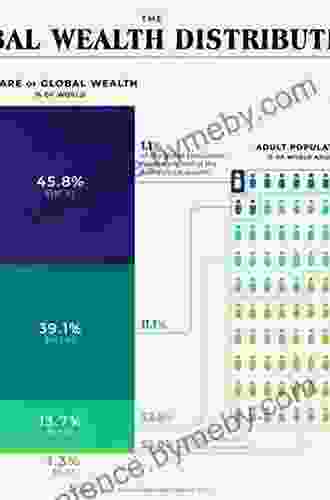Unlocking the Secrets: Concentrated Wealth in the Digital World

In the rapidly evolving digital landscape, wealth is increasingly becoming concentrated in the hands of a select few. This trend, driven by technological advancements, globalization, and the rise of platform economies, has profound implications for societies around the world. The book "Concentrated Wealth in the Digital World" delves deeply into this complex phenomenon, offering a comprehensive analysis of its causes, consequences, and potential solutions.
Ursachen der wealth concentration
5 out of 5
| Language | : | English |
| File size | : | 846 KB |
| Text-to-Speech | : | Enabled |
| Screen Reader | : | Supported |
| Enhanced typesetting | : | Enabled |
| Word Wise | : | Enabled |
| Print length | : | 187 pages |
The digital world is characterized by several key factors that contribute to the concentration of wealth. These include:
- Network Effects: Digital platforms and networks exhibit strong network effects, where the value of the service increases with the number of users. This self-reinforcing cycle leads to the emergence of dominant players who capture a disproportionate share of the market.
- Data Advantages: Digital companies collect vast amounts of data on their users, providing them with valuable insights into consumer behavior and preferences. This data advantage allows them to tailor their products and services to meet specific needs, further entrenching their market dominance.
- Barriers to Entry: The digital world can present significant barriers to entry for new competitors. High capital requirements, complex technology, and established network effects make it challenging for startups to gain a foothold.
- Globalization: Digital technologies have facilitated the globalization of markets, allowing companies to reach customers worldwide. However, this also enables large multinational corporations to dominate global markets at the expense of local businesses.
- Tax Advantages: Some digital companies have taken advantage of international tax loopholes to minimize their tax obligations. This allows them to accumulate wealth more rapidly than traditional businesses subject to higher tax rates.
Konsequenzen der wealth concentration
The concentration of wealth in the digital world has a wide range of consequences for society, including:
- Economic Inequality: Concentrated wealth exacerbates economic inequality, as the gap between the wealthy and the rest of the population widens. This can lead to social unrest, political instability, and reduced economic mobility.
- Reduced Competition: The dominance of a few large digital companies stifles competition, limiting consumer choice and reducing innovation. Smaller businesses and startups may be unable to compete with the resources and advantages of incumbents.
- Erosion of Public Policy: Concentrated wealth can give digital companies significant political influence. They may use their resources to lobby for policies that benefit their interests, undermining the public interest.
- Loss of Civic Engagement: Extreme economic inequality can lead to a decline in civic engagement. Citizens who feel excluded from economic opportunities may withdraw from participation in society.
- Environmental and Social Impact: Digital technologies can have both positive and negative environmental and social impacts. Concentrated wealth in the digital sector may lead to an increased focus on profit maximization at the expense of sustainability and social justice.
Lösungsmöglichkeiten
Tackling concentrated wealth in the digital world requires a multifaceted approach involving governments, businesses, and citizens. Potential solutions include:
- Antitrust Regulations: Governments can use antitrust laws to break up dominant digital companies and promote competition. This may involve breaking up monopolies, regulating data sharing, and preventing anti-competitive mergers.
- Tax Reform: Governments can implement tax policies that reduce tax loopholes and ensure that digital companies pay their fair share of taxes. This can help level the playing field for smaller businesses and reduce the accumulation of wealth at the top.
- Data Regulation: Governments can regulate the collection and use of personal data to prevent digital companies from abusing their data advantage. This may involve implementing privacy laws, data transparency requirements, and consumer protection measures.
- Investment in Digital Infrastructure: Governments can invest in digital infrastructure, such as broadband networks and data centers, to reduce barriers to entry for new competitors and promote competition.
- Labor Market Policies: Governments can implement labor market policies that support workers in the digital economy. This may include providing training programs, promoting lifelong learning, and strengthening labor protections.
- Corporate Social Responsibility: Digital companies can adopt corporate social responsibility initiatives to address the negative impacts of concentrated wealth. This may involve investing in education, supporting social causes, and reducing their environmental footprint.
- Citizen Engagement: Citizens can engage in activism, advocacy, and consumer choices to promote competition, reduce inequality, and hold digital companies accountable. This may involve supporting startups, advocating for policy changes, and boycotting companies that engage in unfair practices.
Schlussfolgerung
Concentrated wealth in the digital world is a complex and multifaceted issue with far-reaching implications for societies around the globe. The book "Concentrated Wealth in the Digital World" provides a comprehensive analysis of this phenomenon, offering valuable insights into its causes, consequences, and potential solutions. By understanding the challenges posed by concentrated wealth and working together to address them, we can create a more inclusive, equitable, and sustainable digital future.
5 out of 5
| Language | : | English |
| File size | : | 846 KB |
| Text-to-Speech | : | Enabled |
| Screen Reader | : | Supported |
| Enhanced typesetting | : | Enabled |
| Word Wise | : | Enabled |
| Print length | : | 187 pages |
Do you want to contribute by writing guest posts on this blog?
Please contact us and send us a resume of previous articles that you have written.
 Book
Book Novel
Novel Page
Page Chapter
Chapter Text
Text Story
Story Genre
Genre Reader
Reader Library
Library Paperback
Paperback E-book
E-book Magazine
Magazine Newspaper
Newspaper Paragraph
Paragraph Sentence
Sentence Bookmark
Bookmark Shelf
Shelf Glossary
Glossary Bibliography
Bibliography Foreword
Foreword Preface
Preface Synopsis
Synopsis Annotation
Annotation Footnote
Footnote Manuscript
Manuscript Scroll
Scroll Codex
Codex Tome
Tome Bestseller
Bestseller Classics
Classics Library card
Library card Narrative
Narrative Biography
Biography Autobiography
Autobiography Memoir
Memoir Reference
Reference Encyclopedia
Encyclopedia Rita Goldberg
Rita Goldberg Matt Patterson
Matt Patterson Jay Dicharry
Jay Dicharry Jay Ross
Jay Ross James Mellon
James Mellon Lana Wedmore
Lana Wedmore Malcolm Jones
Malcolm Jones Rod Powers
Rod Powers Javy Lopez
Javy Lopez Jaymie Scotto And Associates Jsa
Jaymie Scotto And Associates Jsa Jane Springer
Jane Springer Jamie Baulch
Jamie Baulch Stacy Tornio
Stacy Tornio Milton E Polsky
Milton E Polsky Jan Gaye
Jan Gaye Sean Egan
Sean Egan Jeff Margolis
Jeff Margolis Jay Clarke
Jay Clarke Jane Bingham
Jane Bingham Jeremie Kubicek
Jeremie Kubicek
Light bulbAdvertise smarter! Our strategic ad space ensures maximum exposure. Reserve your spot today!
 Gary CoxFollow ·10.9k
Gary CoxFollow ·10.9k Emmett MitchellFollow ·9.9k
Emmett MitchellFollow ·9.9k Henry HayesFollow ·13.3k
Henry HayesFollow ·13.3k Albert ReedFollow ·3.2k
Albert ReedFollow ·3.2k Adam HayesFollow ·10.1k
Adam HayesFollow ·10.1k Jackson BlairFollow ·10.4k
Jackson BlairFollow ·10.4k Diego BlairFollow ·9.1k
Diego BlairFollow ·9.1k Jayson PowellFollow ·12.3k
Jayson PowellFollow ·12.3k

 Franklin Bell
Franklin BellHow Businesses Can Thrive In The New Global Neighborhoods
The world is becoming...

 Rob Foster
Rob FosterCard Manipulations Volume 1: A Masterclass in Deception...
Unveiling the...

 Enrique Blair
Enrique BlairUnveil the Secrets of Card Manipulation: Dive into "More...
Step into the captivating world...

 Jamal Blair
Jamal BlairComedy Fillers 200 Quips One Liners Jean Hugard
Unlock the Secrets of...

 Chase Simmons
Chase SimmonsUnlock Financial Independence: A Comprehensive Guide to...
In a world where financial security seems...

 Dion Reed
Dion ReedUnveiling Global Market Entry Strategies: A Comprehensive...
Global Market Entry Strategies:...
5 out of 5
| Language | : | English |
| File size | : | 846 KB |
| Text-to-Speech | : | Enabled |
| Screen Reader | : | Supported |
| Enhanced typesetting | : | Enabled |
| Word Wise | : | Enabled |
| Print length | : | 187 pages |












